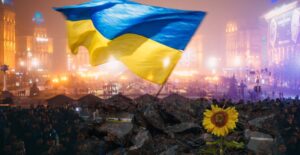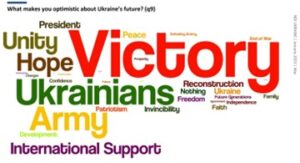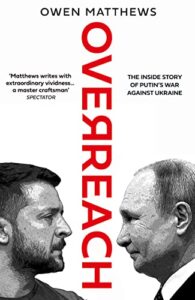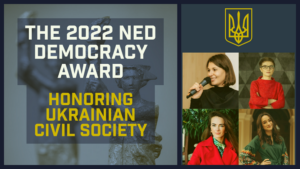The anniversary of Russia’s invasion of Ukraine “stands as a grim milestone – for the people of Ukraine and for the international community,” said António Guterres, Secretary-General of the United Nations. The invasion is “an affront to our collective conscience,” he told the General Assembly’s Emergency Special Session (above).
“The idea was never for hundreds of thousands of people to die. It’s all gone horribly wrong,” a former senior Russian official told The Financial Times. With the initial plan in tatters, Putin is searching for new rationales to justify the war effort, insisting he had no choice but to pursue the invasion by any means necessary, current and former officials say.
“He tells people close to him, ‘It turns out we were completely unprepared. The army is a mess. Our industry is a mess. But it’s good that we found out about it this way, rather than when Nato invades us,’” the former official adds.

Credit: NDI
A stunned oligarch asked [Russian Foreign Minister Sergei] Lavrov how Putin could have planned such an enormous invasion in such a tiny circle — so much so that most of the senior officials at the Kremlin, Russia’s economic cabinet and its business elite had not believed it was even possible, The FT’s Max Seddon, Christopher Miller and Felicia Schwartz write in How Putin blundered into Ukraine — then doubled down.
“He has three advisers,” Lavrov replied, according to the oligarch. “Ivan the Terrible. Peter the Great. And Catherine the Great.”
The Federal Security Service, or FSB, the successor agency to the KGB, assured Putin victory was certain — and paid large sums in bribes to officials in Ukraine in the hope that this would guarantee success, The FT adds:
“The FSB had built a whole system of telling the boss what he wanted to hear. There were huge budgets given out and corruption at every level,” a western intelligence official says. “You tell the right story up top and you skim off a bit for yourself.” …….Some of the liberal officials who oppose the war have attempted to convince Putin to end it by pointing out the economic damage the sanctions are likely to wreak on Russia’s economy.
But Putin tells them “he has already factored in the discounts”, another former senior Russian official says. “He says, ‘We pay a huge price, I get it. We underestimated how difficult it could be.’ But how can you convince a crazy man? His brain will collapse if he realizes it was a mistake,” the person adds. “He doesn’t trust anyone.”
 Recent public opinion research carried out by the National Democratic Institute (NDI) reveals six major mistakes and misunderstandings Russia has made in the Ukraine war:
Recent public opinion research carried out by the National Democratic Institute (NDI) reveals six major mistakes and misunderstandings Russia has made in the Ukraine war:
- Wrong: Personal hardship will convince Ukrainians to accept Russian domination. There is no denying that the full-scale war is taking an enormous toll on lives and livelihoods in Ukraine… [But] NDI’s research shows that Ukrainians remain positive – 89 percent of respondents are optimistic about Ukraine’s future, and the main reason cited for this optimism is Ukraine’s ultimate victory. … In fact, Ukrainian optimism has not diminished in the face of prolonged war and hardship.
- Wrong: Ukrainians will recognize Russia’s role and value in determining Ukraine’s future. Since the beginning of full-scale war, the number of Ukrainians who thought Russia could determine Ukraine’s future has dropped significantly, from 49 percent directly before the war to 18 percent in January 2023….. [and] they are also overwhelmingly positive in their assessment of the influence Ukraine’s Western allies have on determining Ukraine’s future with 72 percent positive assessment of the United States; 79 percent of the United Kingdom; and 73 and 73 percent of the European Union and Canada, respectively. Clearly, the future of Ukraine will be determined by Ukrainians.
 Wrong: Ukraine does not have its own national identity. …Ukraine is consolidating around its democratic, tolerant, and pluralistic future. Support for gender equality has only strengthened since the full-scale war began, with 74 percent of Ukrainians wanting to see a better balance of men and women in political life. Moreover, the majority of Ukrainians support the same rights for LGBT+ people, including civil partnerships. Fundamentally, Ukrainians have chosen their own path and their own values, independent of those historically imposed by Russia.
Wrong: Ukraine does not have its own national identity. …Ukraine is consolidating around its democratic, tolerant, and pluralistic future. Support for gender equality has only strengthened since the full-scale war began, with 74 percent of Ukrainians wanting to see a better balance of men and women in political life. Moreover, the majority of Ukrainians support the same rights for LGBT+ people, including civil partnerships. Fundamentally, Ukrainians have chosen their own path and their own values, independent of those historically imposed by Russia. - Wrong: Ukrainians’ commitment to Euro-Atlantic integration is weak, especially in regions closer to Russia. Support for Ukraine’s Euro-Atlantic integration skyrocketed since the beginning of full-scale war, with 92 percent supporting Ukraine’s EU membership and 86 percent supporting NATO membership. What used to be one of the most divisive topics in Ukraine is now equally supported across the country, including in the East and South. In fact, Ukrainians are more committed to EU and NATO membership than ever.
 Wrong: Increased missile attacks will erode Ukrainian resistance and force territorial concessions. R…Ukrainian’s willingness to negotiate with Russia has dropped significantly since the start of full-scale war. In May 2022, 59 percent supported negotiations. That number dropped to 44 percent in August 2022 and 29 percent in the most recent polling. As the war drags on and evidence of Russian war crimes in recently liberated territories becomes known, the Ukrainian appetite for negotiation wanes. Ukrainians are overwhelmingly committed to victory and liberation of annexed and occupied territories.
Wrong: Increased missile attacks will erode Ukrainian resistance and force territorial concessions. R…Ukrainian’s willingness to negotiate with Russia has dropped significantly since the start of full-scale war. In May 2022, 59 percent supported negotiations. That number dropped to 44 percent in August 2022 and 29 percent in the most recent polling. As the war drags on and evidence of Russian war crimes in recently liberated territories becomes known, the Ukrainian appetite for negotiation wanes. Ukrainians are overwhelmingly committed to victory and liberation of annexed and occupied territories.- Wrong: Political differences among leaders will undermine Ukraine’s unity. …. The four most popular Ukrainian political figures are, respectively, the President of Ukraine (Volodymyr Zelenskyy), the head of the armed forces (Valerii Zaluzhnyi), the most visible civic leader (Serhii Prytula), and the mayor of the capital city (Vitalii Klychko). Hailing from different parties and backgrounds, these leaders have shown remarkable unity and cooperation in unwavering opposition to Russian aggression. Political leaders have remained united throughout the war and will not be subverted.
Recent public opinion research from @NEDemocracy partner @NDI confirms 6 major things #Russia got wrong in invading #Ukraine, incl its failure to break the spirit of Ukrainians or shake their faith in Ukraine’s ultimate victory. https://t.co/ihg67mp7Av
— Democracy Digest (@demdigest) February 23, 2023
It appears that Putin “really believes in his historic mission of restoring the Soviet Union,” said Jamestown Foundation analyst Ksenia Kirillova. “His numerous essays about Russians and Ukrainians being ‘one people’ and his remarks that Ukraine—in his opinion—illegally received Russian territories perfectly illustrate the real reason for Russian aggression—his inability to come to terms with the independence of Ukraine, his personal ambitions, and complete denial of the subjectivity of the post-Soviet states and peoples,” she told Outlook India.
Zbigniew Brzezinski famously wrote, “without Ukraine, Russia ceases to be a Eurasian empire,” notes analyst Anatol Lieven. So the hope expressed in various Western circles that as a result of complete defeat in Ukraine, not only would the Putin regime be toppled, but the Russian Federation itself would be radically and permanently weakened or even disintegrate is not an altogether empty vision, he writes for TIME. As the examples of Iraq and Libya demonstrate, in multi-ethnic authoritarian states with weak civil institutions, regime and state can be so deeply intertwined that the destruction of one leads to the collapse of the other.
 If the war continues as a bloody stalemate after a summer of fighting the momentum for peace – including territorial losses of Ukraine – over justice in the sense of a complete defeat for Putin will grow, says Owen Matthews, the author of Overreach: The Inside Story of Putin’s War Against Ukraine.
If the war continues as a bloody stalemate after a summer of fighting the momentum for peace – including territorial losses of Ukraine – over justice in the sense of a complete defeat for Putin will grow, says Owen Matthews, the author of Overreach: The Inside Story of Putin’s War Against Ukraine.
As former US Under-Secretary of State Rose Gottemoeller told me recently “there can be no return to the status quo ante” after the war – while in the same sentence insisting that “international law must be respected.” Tragically for Ukraine, both those things cannot simultaneously be true, he writes for the IAI.
On February 24, 2022, when Russia launched its full-scale invasion of Ukraine, it was not just another news story for the National Endowment for Democracy (NED) —it was personal, as the brutal war put colleagues, grantees, family, and friends at terrible risk, the NED reports (below). Despite the danger, courageous Ukrainian partners continued their work during the war to document war crimes and atrocities; advocate for international support, mobilize thousands of volunteers across the country; provide independent news, and promote government transparency and accountability.
As we learned in the early weeks of the invasion, the Kremlin planned to “decapitate” Ukrainian society by executing, torturing, or imprisoning political and civic leaders, note Freedom House president Michael Abramowitz and Katie LaRoque, Deputy Director for Policy and Advocacy. In occupied areas that were liberated by Ukrainian forces, though, evidence emerged of Ukrainian officials, activists, and civilian bystanders being detained, interrogated, tortured, and murdered by Russian military and paramilitary fighters.
 It was Ukrainian civil society that performed the vital wartime work of documenting these atrocities and war crimes, and of providing support to those whose lives have been forever changed by the war, they add. The Kremlin is rightly afraid of these individuals and their organizations because it knows how vital they are to the morale and functioning of any nation.
It was Ukrainian civil society that performed the vital wartime work of documenting these atrocities and war crimes, and of providing support to those whose lives have been forever changed by the war, they add. The Kremlin is rightly afraid of these individuals and their organizations because it knows how vital they are to the morale and functioning of any nation.
“The war’s been going on for a year. Putin has been saying he’s fighting the west, not Ukraine, for a long time. You can’t just keep talking about it, you need to take steps to demonstrate something tangible,” says Abbas Gallyamov, a former Putin speechwriter. “Otherwise in his paradigm it’s going to look like the west is wiping the floor with Russia and [he] can’t say anything in response,” he tells The FT.
With Russian forces still occupying more than 15% of Ukraine’s territory, it’s imperative to draw lessons about global security, modern warfare and what can be done to help Ukraine in 2023, says NED partner GLOBSEC.
Year after Russia’s invasion of #Ukraine, the conflict continues to rage on with no end in sight. With 🇷🇺 forces still occupying more than 15% of 🇺🇦 territory, it’s imperative to draw lessons about global #security, modern #warfare & what can be done to help Ukraine in 2023. pic.twitter.com/Nwh4U6T3VO
— GLOBSEC (@GLOBSEC) February 23, 2023







